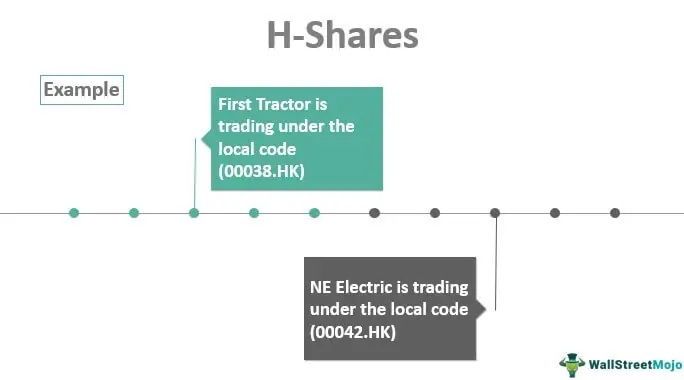What are H-Shares?

H-Shares are a type of equity security that is listed on the Hong Kong Stock Exchange (HKEX) and is denominated in Hong Kong dollars. These shares are issued by companies that are incorporated in mainland China and are traded on the HKEX. H-Shares are specifically designed for foreign investors who want to invest in Chinese companies.
Unlike A-Shares, which are listed on the Shanghai and Shenzhen Stock Exchanges and are only available to domestic investors, H-Shares can be purchased by both domestic and international investors. This allows foreign investors to gain exposure to the Chinese market without the need for a Qualified Foreign Institutional Investor (QFII) status.
H-Shares are subject to the regulations and requirements of both the HKEX and the China Securities Regulatory Commission (CSRC). These regulations ensure that H-Share companies meet certain standards of corporate governance, financial reporting, and transparency.
Investing in H-Shares can provide investors with several benefits. Firstly, it allows them to diversify their portfolio by gaining exposure to the Chinese market. Secondly, H-Shares are traded in Hong Kong dollars, which can be advantageous for investors who want to avoid currency risk. Lastly, H-Shares can provide investors with the opportunity to invest in well-established Chinese companies that have a track record of performance and growth.
Overall, H-Shares are an important investment option for foreign investors who want to access the Chinese market. They provide a way for investors to diversify their portfolio and gain exposure to Chinese companies without the need for a QFII status. However, it is important for investors to carefully research and analyze H-Share companies before making any investment decisions.
Regulation of H-Shares

H-Shares, or Hong Kong-listed shares, are subject to specific regulations that govern their trading and ownership. These regulations are put in place to ensure transparency, protect investors, and maintain the integrity of the market.
One of the key regulations for H-Shares is the requirement for companies to comply with the rules and regulations of both the Hong Kong Stock Exchange (HKEX) and the China Securities Regulatory Commission (CSRC). This means that companies must meet certain criteria and disclose relevant information to the public in a timely manner.
Another important regulation is the restriction on foreign ownership of H-Shares. Currently, there is a limit on the percentage of H-Shares that can be held by foreign investors. This restriction is in place to prevent excessive foreign control over Chinese companies and to maintain the stability of the market.
In addition to these regulations, H-Shares are also subject to the same trading rules and regulations as other stocks listed on the Hong Kong Stock Exchange. This includes rules on trading hours, settlement, and clearing procedures.
Furthermore, H-Share companies are required to have a certain level of corporate governance and financial reporting standards. This ensures that investors have access to accurate and reliable information about the company’s financial performance and operations.
Overall, the regulation of H-Shares plays a crucial role in maintaining the integrity and stability of the Hong Kong stock market. It ensures that companies listed on the exchange meet certain standards and that investors are protected. By complying with these regulations, H-Share companies can attract both domestic and international investors, contributing to the growth and development of the market.
Example of H-Shares in International Markets

One prominent example of H-Shares in international markets is the listing of Chinese companies on the Hong Kong Stock Exchange. These H-Shares are stocks of Chinese companies that are incorporated in mainland China but are listed and traded on the Hong Kong Stock Exchange.
The listing of H-Shares in Hong Kong provides an avenue for international investors to gain exposure to the Chinese market. It allows them to invest in Chinese companies without the need to navigate the complexities of investing directly in mainland China.
One of the key advantages of investing in H-Shares is the transparency and regulation provided by the Hong Kong Stock Exchange. The exchange has stringent listing requirements and enforces strict regulations to protect investors’ interests. This provides a level of confidence and assurance to international investors who may be unfamiliar with the Chinese market.
Furthermore, the listing of H-Shares in Hong Kong also allows for greater liquidity and accessibility. The Hong Kong Stock Exchange is one of the largest stock exchanges in the world, with a wide range of international investors participating in its trading activities. This ensures that H-Shares are highly liquid and can be easily bought and sold.
However, it is important to note that investing in H-Shares also comes with risks. The Chinese market can be volatile, and there may be regulatory and political uncertainties that can impact the performance of H-Shares. It is crucial for investors to conduct thorough research and analysis before investing in H-Shares to mitigate these risks.

Emily Bibb simplifies finance through bestselling books and articles, bridging complex concepts for everyday understanding. Engaging audiences via social media, she shares insights for financial success. Active in seminars and philanthropy, Bibb aims to create a more financially informed society, driven by her passion for empowering others.
